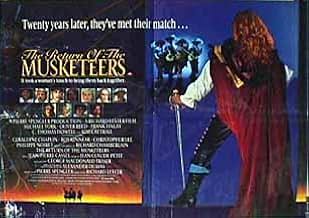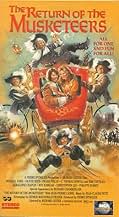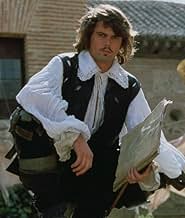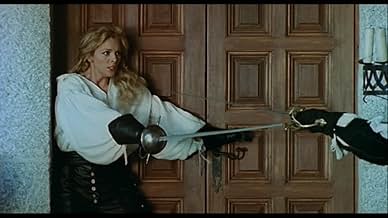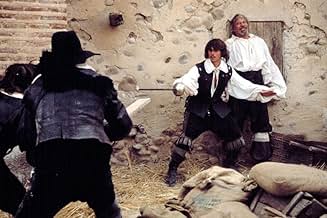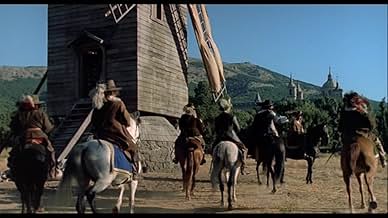IMDb-BEWERTUNG
5,9/10
4029
IHRE BEWERTUNG
In Frankreich werden 1649 die Dienste der vier Musketiere wieder benötigt, und sie treffen auf einige alte Feinde aus zwanzig Jahren zuvor.In Frankreich werden 1649 die Dienste der vier Musketiere wieder benötigt, und sie treffen auf einige alte Feinde aus zwanzig Jahren zuvor.In Frankreich werden 1649 die Dienste der vier Musketiere wieder benötigt, und sie treffen auf einige alte Feinde aus zwanzig Jahren zuvor.
Eusebio Lázaro
- Duke of Beaufort
- (as Eusebio Lazaro)
Jean-Pierre Cassel
- Cyrano de Bergerac
- (as Jean Pierre Cassel)
Handlung
WUSSTEST DU SCHON:
- WissenswertesOn September 19, 1988, during filming in Toledo, Spain, Roy Kinnear fell from his horse, sustaining a broken pelvis. He died from a heart attack the next day at a Madrid hospital. Before the accident happened, Kinnear had constantly protested against riding the horse, because he had no experience in it. He also requested a stunt double, as he also had serious safety concerns. But since they didn't have a stunt double for his part, he was forced to ride the horse, which then led to the accident shortly afterwards. Kinnear's widow, subsequently sued the producers for negligence and wrongful death, winning significant damages and compensation.
- PatzerCromwell is portrayed as leader of the Parliamentarian ('Roundhead') Army and de facto ruler after Charles I's execution. In 1649, however, he was still only second-in-command of the Army (he would not become commander-in-chief until well over a year later, following Sir Thomas Fairfax's resignation). William Lenthall, as Speaker of the House of Commons, was the nearest thing the new English Republic had to a Head of State until Oliver Cromwell took up the reigns of power as Lord Protector in 1653.
- Zitate
Cardinal Mazarin: The people of England will permit anything - except cruelty to horses and a rise in the price of beer.
- Alternative VersionenThe (2009) French DVD edition differs from the earlier UK VHS (and cinema) version. Both Philip Noiret and Jean Pierre Cassel had their voices re-dubbed in the VHS version, but here - on the English language option - their own voices are heard in English. Also several scenes are cut including the scene where D'Artangan gets his assignment from Mazarin to look up his old friends The Three Musketeers and the later scene where King Charles I is playing golf while being arrested by Oliver Cromwell's forces (likewise Michael York's narration of these scenes have been omitted).
- VerbindungenFollowed by Lady Musketier - Alle für eine (2004)
Ausgewählte Rezension
To be honest, though I have not watched them in ages, I am not quite as much a fan of Richard Lester's revisionist version(s) of Alexandre Dumas' swashbuckling saga as I would like (being more partial to the 1948 version which is the one I grew up with); with this in mind, I did not actively seek out to catch up with the belated third entry, neither when it opened in local theaters nor on its sporadic Italian TV appearances! That said, having purchased Anchor Bay's SE DVD set of the 1973/4 adaptations regardless, I also made it a point to finally acquire the film under review
and, though I have been wanting to check it out for the longest time, only got to it now jointly in tribute to James Whale (by way of his definitive 1939 version of THE MAN IN THE IRON MASK) and as part of my current Easter epic marathon!
To cut a long story short, I quite enjoyed the film (though the comedy is still very much frenzied and hit-and-miss in the traditional Lester style) – which had been thoroughly ignored at the time, another reason I was in no special hurry to watch it. Of course, Lester re-acquired the services of most of the principals save, obviously, for the ones who had expired or been replaced (Faye Dunaway and Charlton Heston respectively: amusingly, when the latter wished there was some way to bring Cardinal Richelieu back, the director obliged by having a portrait of him in character hung up in his replacement Mazarin's office throughout the film and which he later donated to the actor!). Still, Jean-Pierre Cassel exchanges roles from the French royal to that of nasally-deformed poet/buffoon Cyrano De Bergerac; incidentally, he had previously 'met' this other popular literary figure – reincarnated by Jose' Ferrer after his 1950 Oscar win! – when himself playing the Musketeer D'Artagnan in an obscure but worthwhile 1963 film by Abel Gance!
The new recruits, however, also proved surprisingly effective: Philip Noiret as Cardinal Mazarin, Prime Minister and Regent in lieu of the child King Louis XIV (though his openly carrying on a relationship with Geraldine Chaplin's Queen Mother is rather in poor taste!); C. Thomas Howell as the adopted son of Oliver Reed's Athos (the sole link to Dumas' "Le Vicomte De Bragellone" aka "The Man In The Iron Mask" – whereas the rest is an adaptation of "Twenty Years After", already solidly brought to the screen in 1952 as AT SWORD'S POINT); and Kim Cattrall as the true villainess of the piece (inevitably, we had to have one here as well), memorably introduced as an axe-wielding monk(!) catching up with the executioner who had beheaded her mother, Milady De Winter – born out of the latter's relationship with Rochefort (played once again by Christopher Lee, despite his vociferous protests over the years of having been paid for the previous outings on a two-films-for-the-price-of-one basis!) and whom she detests and humiliates for having abandoned her.
The plot finds Michael York's D'Artagnan still struggling for a court position, Oliver Reed's Athos typically raising hell under the influence (as befits the actor who passed away in Malta 10 years later during the filming of GLADIATOR {2000} following yet another massive binge in a local bar that was subsequently renamed "Ollie's Pub"!!) – however, whenever he chooses to flex his serious acting muscles, he is as commanding as any thespian, Frank Finlay as an inertly-wealthy Porthos, while Richard Chamberlain's Aramis is now confessor to Chaplin and, though relegated to a "Special Appearance" credit, he does get a reasonably meaty role as a womanizing cleric! Also on hand is Roy Kinnear as an amiably impish Planchet: unfortunately, he would himself die when thrown off a horse while shooting this, an unfortunate accident which led the director to give up film-making altogether (without wishing to pass judgment on him, this decision is in stark contrast to John Landis' essentially unruffled reaction at the even more tragic death of Vic Morrow while TWILIGHT ZONE: THE MOVIE {1983} was being made!).
Anyway, the narrative here incorporates the taking of power from British King Charles I (Chaplin's character's brother) by Oliver Cromwell – in cahoots with Mazarin and Justine De Winter! The Queen Mother dispatches the Musketeers to save him, but they hilariously fail since, having kidnapped the executioner and hiding under the gallows ostensibly to strike at the opportune moment, Cattrall deals the deadly blow herself unheralded! Earlier, the quartet of swordsmen also had found their loyalties divided when D'Artagnan and Porthos opt to serve the Cardinal, while Athos and Aramis take the side of a rather fey Duke (while escaping the unaccountably bumbling Rochefort's clutches – the latter even expires comically in an explosion aboard ship!) which an opposing faction supports. The swordplay is reasonably vigorous (despite the Musketeers showing their age), with Justine often taking them – and Howell – on all at once; her athletic exit, then, rips off Rupert Of Hentzau's from "The Prisoner Of Zenda"! In the end, the film (that, watched on a 40" screen, occasionally exhibited smudgy visuals) essentially marks the transition between the classical era of adventure films to the youth-oriented pictures prevalent today.
To cut a long story short, I quite enjoyed the film (though the comedy is still very much frenzied and hit-and-miss in the traditional Lester style) – which had been thoroughly ignored at the time, another reason I was in no special hurry to watch it. Of course, Lester re-acquired the services of most of the principals save, obviously, for the ones who had expired or been replaced (Faye Dunaway and Charlton Heston respectively: amusingly, when the latter wished there was some way to bring Cardinal Richelieu back, the director obliged by having a portrait of him in character hung up in his replacement Mazarin's office throughout the film and which he later donated to the actor!). Still, Jean-Pierre Cassel exchanges roles from the French royal to that of nasally-deformed poet/buffoon Cyrano De Bergerac; incidentally, he had previously 'met' this other popular literary figure – reincarnated by Jose' Ferrer after his 1950 Oscar win! – when himself playing the Musketeer D'Artagnan in an obscure but worthwhile 1963 film by Abel Gance!
The new recruits, however, also proved surprisingly effective: Philip Noiret as Cardinal Mazarin, Prime Minister and Regent in lieu of the child King Louis XIV (though his openly carrying on a relationship with Geraldine Chaplin's Queen Mother is rather in poor taste!); C. Thomas Howell as the adopted son of Oliver Reed's Athos (the sole link to Dumas' "Le Vicomte De Bragellone" aka "The Man In The Iron Mask" – whereas the rest is an adaptation of "Twenty Years After", already solidly brought to the screen in 1952 as AT SWORD'S POINT); and Kim Cattrall as the true villainess of the piece (inevitably, we had to have one here as well), memorably introduced as an axe-wielding monk(!) catching up with the executioner who had beheaded her mother, Milady De Winter – born out of the latter's relationship with Rochefort (played once again by Christopher Lee, despite his vociferous protests over the years of having been paid for the previous outings on a two-films-for-the-price-of-one basis!) and whom she detests and humiliates for having abandoned her.
The plot finds Michael York's D'Artagnan still struggling for a court position, Oliver Reed's Athos typically raising hell under the influence (as befits the actor who passed away in Malta 10 years later during the filming of GLADIATOR {2000} following yet another massive binge in a local bar that was subsequently renamed "Ollie's Pub"!!) – however, whenever he chooses to flex his serious acting muscles, he is as commanding as any thespian, Frank Finlay as an inertly-wealthy Porthos, while Richard Chamberlain's Aramis is now confessor to Chaplin and, though relegated to a "Special Appearance" credit, he does get a reasonably meaty role as a womanizing cleric! Also on hand is Roy Kinnear as an amiably impish Planchet: unfortunately, he would himself die when thrown off a horse while shooting this, an unfortunate accident which led the director to give up film-making altogether (without wishing to pass judgment on him, this decision is in stark contrast to John Landis' essentially unruffled reaction at the even more tragic death of Vic Morrow while TWILIGHT ZONE: THE MOVIE {1983} was being made!).
Anyway, the narrative here incorporates the taking of power from British King Charles I (Chaplin's character's brother) by Oliver Cromwell – in cahoots with Mazarin and Justine De Winter! The Queen Mother dispatches the Musketeers to save him, but they hilariously fail since, having kidnapped the executioner and hiding under the gallows ostensibly to strike at the opportune moment, Cattrall deals the deadly blow herself unheralded! Earlier, the quartet of swordsmen also had found their loyalties divided when D'Artagnan and Porthos opt to serve the Cardinal, while Athos and Aramis take the side of a rather fey Duke (while escaping the unaccountably bumbling Rochefort's clutches – the latter even expires comically in an explosion aboard ship!) which an opposing faction supports. The swordplay is reasonably vigorous (despite the Musketeers showing their age), with Justine often taking them – and Howell – on all at once; her athletic exit, then, rips off Rupert Of Hentzau's from "The Prisoner Of Zenda"! In the end, the film (that, watched on a 40" screen, occasionally exhibited smudgy visuals) essentially marks the transition between the classical era of adventure films to the youth-oriented pictures prevalent today.
- Bunuel1976
- 14. Apr. 2011
- Permalink
Top-Auswahl
Melde dich zum Bewerten an und greife auf die Watchlist für personalisierte Empfehlungen zu.
- How long is The Return of the Musketeers?Powered by Alexa
Details
- Erscheinungsdatum
- Herkunftsländer
- Sprachen
- Auch bekannt als
- The Return of the Musketeers
- Drehorte
- Produktionsfirmen
- Weitere beteiligte Unternehmen bei IMDbPro anzeigen
- Laufzeit1 Stunde 42 Minuten
- Farbe
- Sound-Mix
- Seitenverhältnis
- 1.85 : 1
Zu dieser Seite beitragen
Bearbeitung vorschlagen oder fehlenden Inhalt hinzufügen

Oberste Lücke
By what name was Die Rückkehr der Musketiere (1989) officially released in India in English?
Antwort

